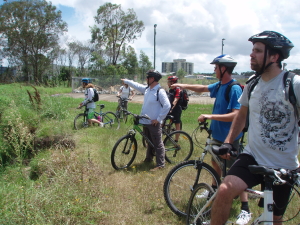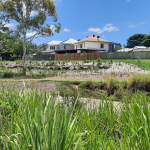Upcoming Events
Stormwater Queensland is delighted to invite you to the second WaterSmart Bus Tour to be held on Wednesday, 29th April 2015. The WaterSmart Bus Tour will be a fantastic opportunity to experience first-hand, a very broad range of catchment management projects and to hear about the challenges and solutions related to each project. This tour will also provide participants with the chance to learn directly from the practitioners involved in bringing the projects to fruition, with plenty of opportunities for questions, debate and discussion.
Sites to be featured on this Technical Tour include:
- Fitzgibbon Chase Urban Development Project: This innovate project site includes:
- The potable roofwater (PotaRoo) project which directs harvested roofwater to a central storage and treatment plant to potable quality for reuse.
- The Fitzgibbon Stormwater Harvesting (FiSH) scheme. The project collects urban stormwater runoff for filtering and disinfection prior to distribution via a 3rd pipe dual reticulation system for on-potable uses.
- Other examples of best practice Water Sensitive Urban Design (WSUD) (e.g. bioretention).
This project was the winner of the 2012 Australian Water Association (Qld) Infrastructure Innovation Award and the 2012 Healthy Waterways Water Sensitive Urban Design Award.
What made this project feasible and why isn’t this level of stormwater treatment applied on every residential development site?
- Pickering St, Enoggera – Natural Channel Design: This was the first attempt at ‘Natural Channel Design’ in Queensland. Lessons from this site continue to influence today’s guidelines and designs. Is the approach taken on this site transferrable to other creeks and what did we learn from this early example?
- Bennett Road, The Gap – fish passage retrofit project: This project aimed to restore fish passage through existing culverts by retrofitting a proprietary fishway. This project was the winner of the 2011 Healthy Waterways Industry Award. Why wasn’t a more natural approach used here and what does the post-construction fish monitoring data tell us about designing such systems?
- Kirralee Crescent, Upper Kedron – ‘Creek Filtration Trial Project’: This system was the first system constructed as part of a trial aimed at exploring low cost ways to managing stormwater in existing urban areas. This project was the winner of the 2014 Healthy Waterways Urban Renewal. Why wasn’t a regular bioretention system constructed here, what cost savings does it offer, is this ‘alternative’ design appropriate and can it be applied elsewhere?
Speakers will include: David Hamlyn-Harris (Bligh Tanner), Grant Witheridge (Catchment and Creeks), Ross Kapitzke (James Cook University), Damian Thompson (Lat 27), Mark Gibson (Brisbane City Council) and Paul Dubowski (BMT WBM).
Register your attendance now, as seats are limited! Click here to Register.
Presenters:
 |
David Hamlyn-HarrisDirector of Water and Environmental Engineering, Bligh Tanner
David is Director of Water and Environmental Engineering and has 34 years’ professional experience in the Australian water industry across all aspects of municipal water supply and wastewater engineering. David has a particular interest in local alternative water management systems, in particular the integration of stormwater harvesting, rainwater tanks and water recycling into urban water infrastructure. He has been responsible for major wastewater treatment plant upgrades and significant water infrastructure planning programs such as the Sydney Olympic Park water management systems and the Pimpama Coomera Waterfutures Master Plan on the Gold Coast. More recently, David has developed guidelines for stormwater harvesting for the Healthy Waterways Partnership; a feasibility study for roofwater and stormwater harvesting for potable use in Melbourne; and has completed several stormwater harvesting schemes including the South Bank Rain Bank and the Fitzgibbon FiSH and PotaRoo. |
 |
Grant Witheridge Grant Witheridge is a civil engineer working in the fields of Hydraulics, Stormwater Management, Waterway Management, Fish Passage, and Erosion & Sediment Control. He has both a Degree and Masters in Civil Engineering from the University of NSW. He has over 30 years of experience in the investigation, modelling and design of hydraulic structures, including 7 years at the University of NSW Water Research Laboratory.Currently Grant is working as an engineering consultant through his own company Catchments and Creeks Pty Ltd.He is the principal author of a number of technical publications including the Brisbane City Council Natural Chanel Design Guidelines, IECA Australasia 2008 Best Practice Erosion and Sediment Control documents, and the 2007 and 2013 editions of the Queensland Urban Drainage Manual (QUDM).Since 1996 Grant has conducted over 500 training courses in construction site erosion and sediment control, stormwater management and waterway rehabilitation. In 2009 Grant was presented with the inaugural ‘Neville Gibson Award’ for services to the stormwater industry by the Queensland Branch of the Stormwater Industry Association. In 2010 Grant was honoured with the ‘Sustained Contributor Award’ for 2009 by the International Erosion Control Association. |
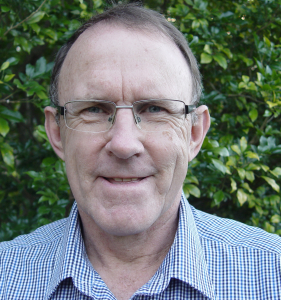 |
Ross Kaptzke Ross Kapitzke is an Environmental Engineer specialising in multipurpose planning and design for waterways, with a particular focus on fish passage design. Ross has worked through James Cook University as a consultant and in R & D in these fields for more than 20 years [http://www.jcu.edu.au/fishpassagedesign/]. He has developed specialist capability in assessment, design and evaluation for fish passage and stream rehabilitation; and in the design, development and testing of fish passage facilities for small waterway structures. Ross’s innovating work in this field has led to design and manufacturing of the award-winning Walaman prefabricated fishway system [http://walaman.com.au/].Ross has played a leading role in the development of fish passage solutions in Queensland for State Government, Councils and other clients. His work includes aquatic fauna connectivity impact assessment at catchment and road corridor scales, and concept design, detailed design and implementation of fish passage mitigation measures for a wide range of fish migration barrier problems. Ross is author of Culvert Fishway Planning and Design Guidelines (James Cook University 2010 – http://www.jcu.edu.au/fishpassagedesign/), and he continues to work on development and assessment of fishway design types and prefabricated fishway components in laboratory, field sites and prototype fishway facilities [http://www.youtube.com/walamanfishways]. |
 |
Damian Thompson Director, Lat 27 Damian is one of the founding directors of the multi-disciplinary design practice Lat27 and has practiced Landscape Architecture for over two decades. His design approach involves the creative interpretation of natural systems in ways that enrich the quality of urban communities. He has a long association with QUT as tutor and guest lecturer and co-founded the 2011 ‘flood of ideas’ project in support of disaster-resilient communities. |
 |
Mark Gibson Senior Engineer Water Management, Brisbane City Council Mark studied a Bachelor of Civil Engineering at the University of Queensland and while studying worked casually at Redlands City Council, Brisbane City Council and Geo-Eng (formally Neville Jones and Associates). Upon graduating Mark accepted a fulltime position at Geo-Eng, who straight away seconded him to Brisbane City Council Flood Management Department. After six months Mark took a fulltime position at the Council. In May 2004, Mark formed his own company, MRG Water Consulting Pty Ltd. MRG Water Consulting has specialised in flood risk management, stormwater quality improvement and assisting developers, mining firms and local government with tricky water issues. In the last 10 years the business has grown to 5 staff, (still small but good!) In 2012, Mark took a part time position at Brisbane City Council again, working in the Water Management Section. Mark works as the director of MRG water Consulting. Working at the Council has allowed Mark to focus on interesting projects such as the creek filtration systems. He is passionate about improving waterway health, reducing flood damage and risk and protecting our critical infrastructure. |
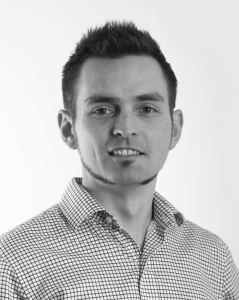 |
Paul Dubowski Senior Environmental Scientist, BMT WBM Paul is a senior environmental scientist with 11 years of experience in the water industry. Since joining BMT WBM in 2010, he has worked across a range of fields including stormwater management, catchment management, ecology and environmental management. Paul has led numerous water sensitive urban design (WSUD) projects from conceptual design through to maintenance, strategic policy and planning, capacity building projects for local governments and catchment/waterways management initiatives. |
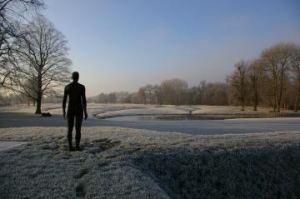
On behalf of Stormwater Queensland, we are pleased to announce that we are holding our very first Winter School Program this August. The Stormwater Queensland August Winter School will feature Workshops conducted by Grant Witheridge (Catchment and Creeks), Jack Mullaly and Andrew O’Neill (Healthy Waterways). The school will be held over a period of five days and allows you to choose individual daily workshops, which suit your needs and to improve your knowledge and skills in stormwater quantity and quality design.
To register for one or more of the workshops, to be held as part of the Stormwater Queensland August Winter School, click here.
Workshop Schedule
| Monday, 31st August | Workshop 1 – Application of the Rational Method and Aspects of Piped Drainage Design Presenter: Grand Witheridge |
| Tuesday, 1st September | Workshop 2 – Water Sensitive Urban Design (WSUD) Principles and Concept Design Presenters: Jack Mullaly and Andrew O’Neill |
| Wednesday, 2nd September | Workshop 3 – Design of Stormwater Outlets and Design of Fauna Sensitive Waterway Crossings Presenter: Grant Witheridge |
| Thursday, 3rd September | Workshop 4 – Water Sensitive Design (WSUD) Detailed Design Presenters: Jack Mullaly and Andrew O’Neill |
| Friday, 4th September | Workshop 5 – Treatment of Creek Erosion and Natural Channel Design Presenter: Grant Witheridge |
Workshop Outlines
The following Workshops will be presented over the five days of the Stormwater Queensland August Winter School:
Workshop 1 (Part 1) – Application of the Rational Method
Introduction to the various hydrological methods used to determine design discharge or small to medium catchments. Detailed discussion is provided on the application of the Rational Method and the various procedures as presented within the Queensland Urban Drainage Manual for the determination of time of concentration. It is hoped that the Workshop will also provide students with an update on AR&R attitude to the continued use of the Rational Method in drainage design.
Workshop 1 (Part 2) – Aspects of Piped Drainage Design
This workshop has been developed for practitioners who have past experience in stormwater drainage design. Discussion is provided on the reasoning behind many of the design rules used in pipe drainage design. The workshop reviews hydraulic gradeline (HGL) analysis, structure losses, methods to achieve a reduction in pit losses, and the hydraulics of inlet structures.
Workshop 2 – Water Sensitive Urban Design (WSUD) Principles and Concept Design
This workshop will focus on the application of WSUD to reduce the impact of urbanisation and meet state and LG policy requirements. The workshop will include training on implementing WSUD principles, WSUD concept design and integration. This will include practical exercises in WSUD concept design that can be highly valuable when preparing stormwater management plans.
Workshop 3 (Part 1) – Design of Stormwater Outlets
This workshop reviews the design of stormwater outlets, and their integration into various receiving environments, including discussion on aesthetics, headwall design, pubilc safety, inlet and outlet screens, erosion control, maintenance and water quality issues.
Workshop 3 (Part 2) – Design of Fauna Sensitive Waterway Crossings
This workshop focuses on the design of various types of waterway/roadway crossings, with the aim of minimising their impact on aquatic and terrestrial fauna passage. The workshop reviews design and rehabilitation of waterway culverts.
Workshop 4 – Water Sensitive Urban Design (WSUD) Detailed Design
This workshop will focus on the detailed design of wetlands, bioretention and swales. This workshop will include working through a detailed “WS design”, also considering a number of other aspects of stormwater drainage design, that has been included in other Winter School workshops (e.g. outlets, hydraulic calculations, etc).
Workshop 5 (Part 1) – Treatment of Creek Erosion
This is a practical-based workshop on the various forms and causes of creek erosion, providing detailed discussion on the selection and application of a wide range of treatment techniques. The primary focus of the workshop is on the use of natural materials, such as vegetation and rock to control creek erosion.
Workshop 5 (Part 2) – Natural Channel Design
This workshop introduces the concepts of Natural Channel Design (NCD) for use in the design of drainage channels and the rehabilitation of minor watercourses, within heavily modified catchments. The workshop will also discuss some of the lessons learnt since the release of Brisbane City Council’s NCD Guidelines of 2000.
Registration Fees
Stormwater Queensland are committed to providing high quality professional development opportunities to our members. As the August Winter School is a new initiative of the Association, Stormwater Queensland have subsidised the Workshop registration fees by more than 50% of their full value.
| (Fee per Full Day Workshop) | |
| Member | $250.00 |
| Non Member | $350.00 |
| Student | $50.00 |
Please Note: For Participants wishing to attend multiple Workshops, a 20% discount will be applied.
Registration to attend these Workshops includes Morning Tea, Lunch and Afternoon Tea.
Should you have any questions regarding registration, please email registration@gemspl.com.au.
If you would like to know more about the Stormwater Queensland August Winter School, please contact Stormwater Queensland on 1300 721 220.

The 2015 Annual General Meeting of Stormwater Queensland will be held on Thursday, 24th September 2015.
Nominations for a position on the Management Committee of Stormwater Queensland will be open 21 days prior to the AGM. If you wish to register your interest in joining the Committee for 2015 – 2016 please contact the Association Secretariat on (02) 9744 5252 or email siaqadmin@stormwater.asn.au
- Dr Andrew O’Neill, Healthy Waterways
- Elissa McConaghy, Moreton Bay Regional Council
- Josie Raftery, Toowoomba Regional Council
- Kym Whiteoack, RMCG
- Tony Costantini, Planfuture (representing Port of Brisbane)
The Forum will be facilitated by Belinda Chapman from Working Wheel.
Speaker Biographies:

biogeochemistry of constructed wetlands treating acid mine drainage, Andrew conducted research into the disposal of high level nuclear waste in deep rock aquifers in Sweden, degraded river and lake systems in Indonesia, Canada and the USA and natural wetlands and hot springs in Yellowstone and Kamchatka. Andrew has been responsible for the design and delivery of high profile integrated water policy and water sensitive urban design projects in both the public and private realm, and supports uptake of sustainable urban water management with both Australian and international professionals and students.
Elissa McConaghy is a Senior Strategic Planner at Moreton Bay Regional Council with over 10 years’ experience in strategic land use and infrastructure planning. Elissa graduated from Griffith University with a Bachelor of Environment Planning in 2003 and has experience in the fields of development assessment, park and open space planning and design, planning scheme and policy development and infrastructure network planning and charging. Elissa currently manages Moreton Bay Regional Council’s strategic water program covering total water cycle management, floodplain management, and coastal management.
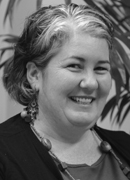
She is passionate about the future, understanding the bigger picture and planning based on good evidence. Her approach to planning is aims to build communities by breaking down silos and finding better ways to communicate expertise.
In her current role, Josie is focussed on the planning and design of public infrastructure for multiple uses to deliver efficiency and better urban design. This includes her focus on the integration of stormwater management with public open space considering the range of values and expectations placed on Toowoomba’s local creeks.

Kym Whiteoak is a Senior Economist with RMCG with expertise in the economic assessment of water quality offsets and the cost-effectiveness of water quality improvement actions. Kym is currently assisting a Victorian water business design, assess and implement a water quality offset, and has assisted many councils and water businesses compare the cost-effectiveness of different stormwater management options as part of integrated water management plans.
Emma O’Neill is the Coordinator (Integrated Water Management) at Ipswich City Council.
Emma has a background in environmental management and planning and in 2015 completed the International Water Centre’s Water Leadership Program as a recipient of the Healthy Waterways Erosion and Sediment Control Leadership scholarship.
Recently Emma project managed (in conjunction with consultants BMTWBM) the development of a robust and transparent framework to guide the use of funds collected under Council’s stormwater quality offsets scheme.
Prior to her role at ICC Emma worked in the Hawke’s Bay in New Zealand dealing with complex water management challenges including assessment of impacts of oil exploration on receiving environments, review of urban stormwater management programs, and highly contentious water allocation projects.
Sally Boer, Stormwater Queensland
This forum will provide the opportunity to develop a common appreciation of associated issues, complexities and future planned activities.
- To improve understanding of innovative pathways for stormwater quality management including but not limited to offsets.
- To improve understanding of current and future planned activities to innovate pathways for stormwater quality management including by not limited to offsets.
- To augment the development of the Stormwater Queensland position statement on innovative pathways for stormwater quality management including but not limited to offsets.
|
Member
|
$190.00
|
|
Non Member
|
$230.00
|
|
Student
|
$120.00
|

On behalf of Stormwater Queensland and the International Erosion Control Association Australasia, we are pleased to announce that registration is now available for the ‘Local Governments Role in Managing Erosion and Sediment Control’ Seminar to be held on Thursday, 14th April, 2016 from 1.30 pm to 5.00 pm at Riverlife Brisbane.
Seminar Focus
The implementation and management of erosion and sediment controls on Queensland urban development construction sites has been historically poor with studies undertaken by Healthy Waterways indicating up to 95% of sites are not compliant. Local governments can play a vital role in the management of erosion and sediment control from the development application process through to regulation on the ground. Although there is improvement by some local governments, in general the approach is very ‘hands off’ resulting in poor site management and water quality outcomes.
In contrast many Council’s in New Zealand including Auckland Regional Council adopt a very different ‘hands on’ approach with no cost to Council. This forum will include a panel session, discussion and a presentation from Michael Parsonson from Southern Skies Environmental who has been involved with erosion and sediment control policy in Auckland. The discussions will provide insight into alternative strategies that could be adopted by local governments to provide a greater level of protection to waterways.
Registrations for this Seminar is now closed.
Seminar Panelists
Michael has over 18 years environmental management experience, gained from geotechnical consultancy, consents and compliance, project management and team management roles at the Auckland Regional Council, and as a director of SouthernSkies Environmental Limited. Michael’s experience covers the assessment and preparation of permits and approvals under regional and district plans, policy and plan development, expert witness services, site auditing, development of best practice guidelines for practitioners, peer reviewing, and construction environmental training. This breadth of experience in regulatory, technical, planning, political interface, team management and programme management roles assists in the delivery of all his projects. Michael is also a certified and experienced independent hearings commissioner.
Leon is an Engineer with 16 years experience in the fields of urban stormwater management, water sensitive urban design, erosion and sediment control and floodplain management. Leon started his own business in 2014 and has provided ESC auditing for major clients including developments by Stockland and LendLease as well as providing policy and auditing advice for Local and State Government. Prior to this Leon ran the ESC compliance program for Sunshine Coast Council and played a key part in the Council achieving the Ministers Grand Prize at the Healthy Waterways Awards in 2009. Leon is an acknowledged expert in the field of integrated water management, having held a position on the Scientific Expert Panel of Healthy Waterways and being an acknowledged contributor to a number of key industry guidelines on the topic.
Kel has been working as an environmental professional for over fifteen years with ten years’ experience in the construction industry. During this time he has been involved on both the Client and Contractor side of the fence on a large number of construction projects ranging from electrical substations to high pressure gas pipelines and large-scale dams. Kel has spent the last 5 years working in the CSG industry primarily as the Corporate Environmental Advisor for Soil and Erosion at one of the major CSG companies. As the start of 2016, Kel started work with Ipswich City Council as their specialist for everything related to erosion and sediment control. The main goal for the role is to improve the level of compliance on construction projects in the area through a combination of education and enforcement.
Terry is a Principal Environmental Engineer with over 13 years direct experience in the area of soil and water management. His professional experience includes ESC, stormwater management, contaminated land, acid sulfate soil investigations, project management and delivery of specialist training. Terry is currently employed as ESC Technical Services Manager for O2 and has previously held roles within both private industry and Local Government. This experience has provided him with a comprehensive understanding of the entire development process from the initial project conception, design and construction phases and subsequent final delivery. Terry has gained a high level appreciation of the challenges, constraints and impacts associated with application, monitoring, training and compliance with ESC requirements for both clients and contractors.
During his time with O2, Terry has specialised in erosion and sediment control, and has been responsible for the planning, design, supervision, auditing and management of ESC aspects on some of Queensland’s largest infrastructure projects. Terry holds the internationally recognized qualifications of Certified Practitioner in Erosion and Sediment Control (CPESC) and Certified Professional Soil Scientist (CPSS). In addition, Terry is a Registered Professional Engineer of Queensland (RPEQ).
Terry regularly presents a range of ESC training courses in accordance with IECA (2008) and has trained over 1,000 people in QLD, NSW, NT and TAS. He has been invited by Griffith University to sessional lecture Engineering Design and has previously presented ESC training at Sydney TAFE.
Mr Mark Gibson is an experienced engineer with over 20 years’ experience in local government and private industry. He is a specialist in stormwater quality and quantity management, erosion and sediment control, waterway health enhancement and water policy and planning. Mark has completed a Bachelor of Civil Engineering and a Graduate Diploma in Integrated Water Management. He is a Registered Professional Engineer of Queensland and a Member of Engineers Australia and Stormwater Queensland. Mark has most recently been involved in reviewing and updating the Brisbane City Council’s hazard assessments, standards and requirements for Erosion and Sediment Control plans and programs. Mark has worked as a Principal Engineer in with Brisbane City Council for the past four years as well as being the Director of MRG Water Consulting Pty Ltd. Mark has extensive industry knowledge of the design and use of Erosion and Sediment Control measures for residential and industrial construction sites.
Coops Drainage and Civil has been operating in South East Queensland for the past 30 years with projects ranging from problematic drainage solutions to large scale subdivisions and inter-regional infrastructure.
Coops Drainage and Civil has experience in the construction of full subdivision projects, storm water drainage, large pump stations, trunk sewer reticulation and trunk water reticulation projects. This experience includes bulk earthworks, detailed earthworks, road works and pavement, vacuum sewer, recycled water, structural concrete, box culverts, and pipeline testing with NATA Accreditation.
To download a map of Riverlife and suggested transport options, please click below:
If you would like to continue in the discussion on Local Government’s Role in Managing ESC and further explore the reasons behind poor compliance of ESC in urban development in Qld, IECA are hosting drinks and BBQ after the seminar at Riverlife. You will also have the opportunity for further discussions with Michael Parsonson from New Zealand in regards to alternative policy and regulation strategies. To register your attendance at this event, please click on the following link http://www.austieca.com.au/events/event/lets-talk-dirt
If you have any questions relating to this Seminar, please do not hesitate to contact Lilly Barker at GEMS Event Management on +61 2 9744 5252 or via email lbarker@gemspl.com.au.
Stormwater Queensland in conjunction with Stormwater Australia are hosting an update session on the New National Protocol for the Evaluation of Stormwater Quality Improvement Devices will be held at The Greek Club from 1.30 pm to 3.00 pm on Tuesday, 21st June.
Background
There are statewide provisions for stormwater quality management in the State Planning Policy, and many local governments also have stormwater quality provisions within their planning scheme.
Over the past several years there has been concern over the lack of a clear framework to verify the performance claims for proprietary stormwater products, also known as stormwater quality improvement devices (SQID). This has become a point of tension in the development assessment process.
Over the past two years Stormwater Australia has been developing a Stormwater Quality Improvement Devices Evaluation Protocol (SQIDEP). The protocol developed this far has a particular focus on providing guidance on field testing requirements, collection, analysis and presentation of data, and ensuring the process is both technically competent and sufficiently independent to support confidence in the outcomes.
The draft SQIDEP can be downloaded by clicking the link below or alternatively please cut and past the following link into your web browser:
Stormwater Queensland in conjunction with Stormwater Australia will be hosting a public event providing an update on the SQID Protocol, This event will comprise of a general information session and open to a broad cross section of stakeholders and interest groups including manufacturers and vendors of products. Local government officers, consultants and other relevant stakeholders are also invited to attend in order to understand the basics of the protocol. This event will be held from 1.30 pm until 3.00 pm on the afternoon of Tuesday, 21st June, 2016.
Cost:
Free Registration is provided to members of Stormwater Queensland Members. Registration for non members is $65 per person.
To register your place for the SQID Update Session, click on the button below, which will take you to the online registration form.
Online registration will close on Friday, 17th June
Should you have any questions regarding registration, please email registration@gemspl.com.au.
If you would like to know more about the SQID Update Session, please contact Stormwater Queensland on 1300 721 220.

Following the success of our inaugural 2015 Winter School, Stormwater Queensland is proud to be hosting our second Winter School, providing ongoing professional development opportunities for the industry.
This year’s Winter School will include a Full Day Technical Tour, showcasing several innovative ‘real world’ projects within Ipswich City. By popular demand, Grant Witheridge will also present an Advanced Erosion and Sediment Control Workshop.
This year’s Winter School will coincide with our Stormwater Queensland Awards for Excellence (held on Thursday, 7th at Dockside) to assist with industry professionals travelling from across the state.
This Winter School is targeted at staff from all areas of the stormwater industry including civil engineers, environmental engineers, hydrological and hydraulic engineers, urban designers, urban planners and local government officers.
To register for the Technical tour, Workshop or both, click on the below button, which will take you to the Online Registration Form.
WEEK AT A GLANCE
Tuesday, 5th July
Technical Tour of Ipswich – Includes a fish passage project, flood mitigation works , and multi-functional stormwater projects.
Presenters –Adam Berry, and Paul Smith Ipswich Council, Paul Dubowski, BMT WBM and David Sexton, Engeny
Wednesday, 6th July
Workshop – Advanced Erosion and Sediment Control Training
Presenter: Grant Witheridge, Catchments and Creeks Pty Ltd
Thursday, 7th July
2016 Stormwater Queensland Awards Presentation Luncheon
To find out more about the Stormwater Queensland Awards Presentation Luncheon, please click here
TECHNICAL TOUR – 5th July
The Technical Tour will be a fantastic opportunity to experience first-hand, a very broad range of catchment management projects and to hear about the challenges and solutions related to each project.This tour will also provide participants with the chance to learn directly from the practitioners involved in bringing the projects to fruition, with plenty of opportunities for questions, debate and discussion.Sites to be featured on this Technical Tour include:
- Redbank Plains Recreational Reserve Integrated Urban Stormwater Project: This recently constructed project includes a flood detention basin (providing 90 000m3 of flood storage) and stormwater harvesting wetland
- Berry’s Weir Fish Passage: Currently being constructed (with completion expected before the tour) to provide fish passage through this identified high priority barrier on the Bremer River.
- Jim Donald Parklands Multi-functional Stormwater Project: Currently being constructed (with completion expected before the tour), this project will comprise a multi-functional asset that provides flood mitigation, stormwater quality improvement, stormwater harvesting, new irrigated sports fields and open space integration within the surrounding area.
- Thagoona Flood Mitigation Works: Developed in response to devastating floods in 2008 and 2011 and subsequent detailed planning, works including a large earthen levee, drainage channel, culverts and an upgraded rail bridge to the south of the area.
ADVANCED EROSION AND SEDIMENT CONTROL WORKSHOP – 6th July
Presented by Grant Witheridge, this workshop will include two elements:
- Development of Erosion and Sediment Control Plans: Focusing on the preparation of ESC’s for various construction sites.
- Sizing Drainage and Sediment Control Measures: Discussing the hydraulic design (sizing) of various drainage and sediment control measures, including detailed discussion on sediment basin design.
The Workshop will include a workbook, practical work activities and catering for morning tea and lunch.
LOCATION AND TIMES
Tuesday, 5th July and Wednesday, 6th July 2016 (9.00 am – 5.00 pm)
The Landing at Dockside – 44 Ferry Street, Kangaroo Point, 4169
REGISTRATION FEES
|
If you would like to register for this event, please contact Lilly Barker on +61 2 9744 5252 or via email lbarker@gemspl.com.au
Stormwater Queensland are pleased to present the 2016 Awards for Excellence Presentation Luncheon.
The award categories for the 2016 Awards for Excellence are:
- Excellence in Strategic or Master Planning
- Excellence in Infrastructure
- Excellence in Asset Management
- Excellence in Research and Innovation
- Excellence in Policy or Education
- Excellence in Integrated Stormwater Design
If you would like to register for this event, please contact Lilly Barker on +61 2 9744 5252 or via email lbarker@gemspl.com.au.
National Awards for Excellence
Under the Awards for Excellence protocol adopted by Stormwater Australia, only the recipients of the State Awards for Excellence will be eligible for the National Excellence Awards. Preceding two years of State award winners (2015 and 2016) will be eligible for the National Awards in 2016. Therefore, entry of a project into a State Excellence Awards is a minimum prerequisite for participation in the National Awards.
The National Awards is held every two years. The next National Awards will be announced at the Stormwater National 2016 Conference in Brisbane, Queensland on Wednesday, 31st August, 2016.
Should you have any questions about the 2016 Stormwater Queensland Awards for Excellence, please contact Event Coordinator, Lilly Barker on +61 2 9744 5252 or via email to lbarker@gemspl.com.au.

Stormwater Australia invites you to attend STORMWATER 2016, the 4th National Conference convened by Stormwater Australia, to be held from Monday, 29th August to Friday, 2nd September, 2016 in Surfers Paradise, Queensland.
In 2009, the United Nations reported that more than half the world’s population lived in urban centres. This proportion is set to increase to 66% by 2050, when it is estimated that city dwellers will live and share their neighbourhoods with an additional 2.5 billion people.
As our cities grow and evolve, it is imperative that we manage our resource and our natural resources to ensure they continue to provide clean, healthy environments for ourselves and the next generation. Access to adequate supplies of safe and fit-for-purpose water will be increasingly important to meet the needs of a growing population, while the responsible management of runoff from both increasing sprawl and density in existing urban areas will be needed to increase our resilience to natural disasters such as flood and heat waves, and to avoid further environmental and social degradation.
The modern stormwater industry seeks to balance traditional issues with emerging priorities which are being placed on our infrastructure. Practitioners are experienced in working at the coal face, often pragmatically dealing with issues in a complex environment where policy requirements are often unclear, but the demand for good outcomes and multiple benefits are not. The growing need to work in multidisciplinary teams, to lead and influence, to understand and assimilate different points of view and technical requirements, will be core skills required in the future.
Challenge and change brings opportunity. Fiscal constraints are an ever present reality. New and emerging technologies are developed to provide technical solutions. Increasingly we are seeing new business models that empower greater choice. Increasingly we are looking to solve nexus issues around water, energy and food. In an increasingly connected world, information has a new currency to support decision making and engagement with community. As economies around the world transition to make better use of all this knowledge, there is potential to develop new markets and trade opportunities.
The ‘Rising to the Challenge’ Conference will reach out beyond our core industry practitioners to engage with a broader group of committed and talented people who will all need to work together to develop the solutions of the future. Stormwater Australia invites you and your colleagues from all disciplines and experiences to participate in what we anticipate to be an exciting and engaging Conference that builds upon earlier successes, inspires participants and provide opportunities for collaboration and knowledge sharing.
For all enquiries and registrations please visit – www.stormwater2016.com.au


